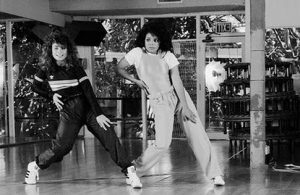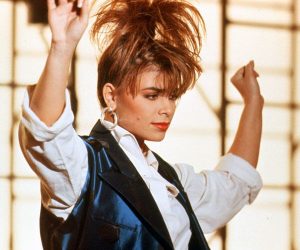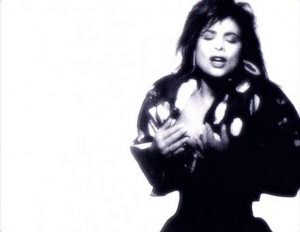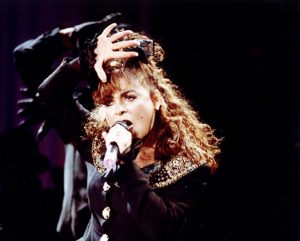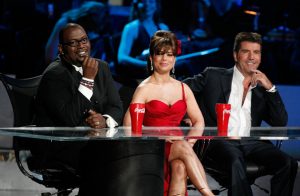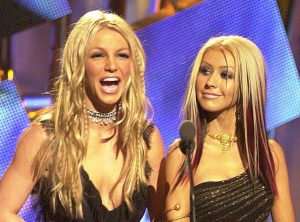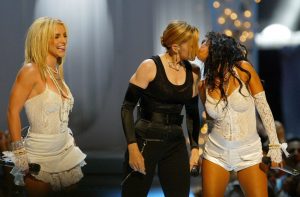I avoided this book for a very long time, and after finding a copy of it at the library (despite it not even being on my TBR), I decided it was time to give it a shot.
I avoided Room for a very simple reason: I just thought it would be too real. Real-life kidnapping cases have always interested me. I've followed the story of Jaycee Dugard's rescue after 18 years in captivity (during which she bore two children with her captor), and the three girls in Cleveland who were rescued in 2013 after 11 years in a madman's house. It wasn't that I thought Room would get it wrong or anything; I just didn't think I could bring myself to read something fictional about a situation that has appeared several times in the news over the last decade, and given the fact that I followed those real stories very closely, I just didn't think I could handle reading about the same thing in fiction. But then I remembered that I heard Room is narrated from the 5-year-old boy's perspective, so I thought that might make it a bit easier. And it did, but it still shattered my heart into a thousand pieces.
Room is told through the perspective of 5-year-old Jack, whose entire world is a space called Room, where he lives with Ma. Ma, unwilling to disappoint Jack with a life she cannot give him, allows Jack to believe that the rest of the world exists only on television. Ma tries her best to keep Jack healthy and happy via both physical and mental exercises, keeping a healthy diet, limiting television time, and strict body and oral hygiene (sacrificing her own hygiene as a result). The only other person Jack has ever seen is "Old Nick," who visits Room at night while Jack sleeps hidden in a wardrobe. Old Nick brings them food and necessities. Jack is unaware that Old Nick kidnapped Ma when she was 19 years old and has kept her imprisoned for the past seven years. Old Nick regularly rapes Ma; Jack is the product of one such sexual assault. At the beginning of the book, Jack has turned five, and Ma soon learns that Old Nick has become unemployed and is danger of losing his home to foreclosure. Fearing for their lives, Ma decides that Jack is old enough to learn the truth, and explains that everything on television is in fact real and exists outside Room, as well as the fact that Old Nick kidnapped her and he now needs to help them escape.
The perspective of Room is so important to everything that takes place, and it honestly makes the book so much more readable and enjoyable, because it takes the severity out of Jack and Ma's situation (even though you don't want it to). Ask yourself; what's really severe to a 5-year-old, let alone a 5-year-old who thinks Room is the entire world? As the story progresses, you can see the immediate culture shock and differences between Ma and Jack, even before they attempt their escape: Ma has done her best to protect her child despite the most unspeakable circumstances, but it has gotten to a point where sticking their heads in the sand for the sake of childhood isn't helping anyone anymore. You can also tell very easily that things have gotten out of hands in other ways, such as the way that Ma is slowly losing herself after being locked up and abused in Room for so long, but for Jack, Room is a happy place where he has spent his entire life with his mother, and Ma is horribly upset and can no longer bring herself to listen to Jack romanticize a place where she has suffered for seven long years. Not to mention that Ma struggles deeply with depression as a result of her situation, often having what Jack perceives as days where she's "Gone" (stays unresponsive and asleep in bed all day long). Reading Room really reminded me of what it is like to be 5 years old: so blissfully innocent and full of love, and the perspective is written so strongly that I must tip my hat to Emma Donoghue (this must not have been easy to write in any way, shape or form). I'm sure there are many different interpretations and analyses of what the main themes are in this book, but the only important one to me is the strong bond and relationship a mother and child can share. It reminded me so nostalgically of what it was like to be a young child and have such a deep connection with an adult around you, and Jack and Ma's dangerous situation only intensified their bond and connection: to quote a young Dakota Fanning from I Am Sam, "All you need is love." The fact that the tabloids and general public in the story chose to gawk and criticize how Ma raised her child in an unthinkable and heartbreaking situation only reinforces that; who are we to dictate and criticize how people should act in unthinkably bad situations? The public always needs something to talk about, even at the expense of other people's privacy and feelings.
After finishing Room, I of course watched the film adaption, starring Brie Larson in the role of Ma and Jacob Tremblay in the role of Jack. Usually, when I watch a book's film adaption right after finishing the book, I am more critical and don't end up enjoying the movie as much, because the story is still so fresh in my mind and I nitpick little details that didn't translate from the page to the screen. Conversely, when I read a book that is adapted into a movie that comes out a certain amount of time after I've read it, the story in the book is less fresh and I end up enjoying the movie because I don't feel the need to nitpick little details. Room is officially the first book/movie to break that rule of mine. While I did find myself immediately recognizing differences (I'm always going to do that, regardless of how long it's been), Room the movie can almost stand alone from Room the book. In other words, it's not one of those movies where you won't understand its full effect if you haven't read the book. The story was built for the screen in a really illuminating way, and is actually a rare case of the movie filling in some blanks and question marks from the book: after all, the book is narrated entirely from the perspective of a 5-year-old boy who has never left a space called Room. While it does offer a new and unique perspective that serves the story better than if Ma had narrated, I was still intrigued to know how an adult would perceive Room as opposed to a child who has only ever known this space as his entire world. It only reminds how absolutely heartbreaking the story is, but somehow heartbreaking in a good way. Love is truly all we need. 5/5 stars.
Thursday, June 28, 2018
Friday, June 22, 2018
Book Review: 'I Stop Somewhere' by T.E. Carter
"There's that nursery rhyme. You know it? All about what makes a girl. We're sugar and spice and everything nice, but that sounds like a cookie recipe. It doesn't sound like the composition of a person."
This book hit me like a ton of bricks. I Stop Somewhere is one of the most powerful books I've ever read. I'm actually struggling to come up with the title of another book that's just as powerful as this one, so it might actually be the most powerful book I've ever read.
Ellie Frias disappeared long before she vanished. Tormented throughout middle school, Ellie begins her freshman year with a new look: she doesn't need to be popular; she just needs to blend in with the wallpaper. But when the unthinkable happens, Ellie finds herself trapped after a brutal assault. She wasn't the first victim, and now she watches it happen again and again. She tries to hold on to her happier memories in order to get past the cold days, waiting for someone to find her. The problem is, no one searches for a girl they never noticed in the first place.
It's been quite awhile since I've read a YA book that is written in such a distinct style as I Stop Somewhere. Not to mention the writing is SO strong. It's SO well written, it blew me away. It's hard to believe this is the author's debut novel. I actually found myself stopping after certain paragraphs saying, "Damn. That's powerful." It's definitely not the first YA book to touch on the ugly parts of teenage girldom, let alone the first book at how hard it is to be a girl. But I Stop Somewhere is just written so naturally that I believe anyone could pick up this book and understand the bullshit that our society forces females to go through. This book has been promoted as tackling rape culture, misogyny, privilege, class and wealth and it's definitely about all of those things - there is absolutely no question. There's also no question that there have been and will be a lot more of books about those things given the rise of the #MeToo and #TimesUp movements. But I Stop Somewhere especially stands out, in my opinion, as the intricate portrait of a girl's mind. The book moves between the past and present, with Ellie telling the story in both tenses. She is not perfect, and at times the story asks the reader to question whether or not Ellie is actually a victim - and that's what I Stop Somewhere is truly about when it comes down to it. It's about how our society, still unfortunately very male-dominated, decides for girls and women whether or not they were violated. It's not up to the girls. Some are not believed, but even those who are believed are forced to plead their case as to why they believe or think why they were violated. We can't just take their word for it. It's truly, inexplicably awful, but oh so important to remember, and I Stop Somewhere does a remarkable job at it.
Ellie is a flawed character and narrator, but that's what makes her perfect. It is her perspective and recounting of events, a female one, that we need to hear, because (at the risk of sounding too much like a social justice warrior) men are not trustworthy. They just aren't. Men aren't raised in the same world as women. Through Ellie, the author looks at a number of things, bigger than rape culture and misogyny: she explores the way society treats girls and puts their personality and lifestyle on trial in rape cases. She explores how easily we dismiss their bodies as things to be taken, cast aside, or consumed as desired. Just as in some old nursery rhyme, it seems as though women were historically designed to be "sugar and spice and everything nice," and as objects for men. Wasn't it Simone de Beauvoir who said, many years ago, in her book The Second Sex that what are women but an object of desire? I know we cast away certain feminist approaches that deal with these issues too harshly or "the wrong way" but these issues are reality. They are. Really and truly. And if you can't bring even part of yourself to understand that, you're probably a man.
I Stop Somewhere is not to be missed. Raw, emotional, powerful, important, and real. Please go read it, and don't skip the author's note at the end. Highly, highly, HIGHLY recommend. 5/5 stars.
Monday, June 18, 2018
Paula Abdul Was Almost the Pop Princess of Her Era: Celebrating 30 Years of 'Forever Your Girl'
In the popular culture of today, Paula Abdul is remembered for her tenure as the zany but kind-hearted judge on American Idol for its first eight seasons, a highly respected choreographer from the music video era, and the dance-pop hits she scored in the late ‘80s and early ‘90s before disappearing from the pop music landscape. Last week marked the 30th anniversary of her debut studio album that launched her into pop stardom as the original pop princess (some say she was almost the Britney Spears of her era)—Forever Your Girl. Feel old yet?
- Paula Abdul choreographing with Janet Jackson, early 1980s
Abdul’s Miss America personality and dance moves propelled the album to record-breaking success—at the time, it was the most successful debut album of all-time, and the first time an artist had scored 4 number-one hits from a debut album on the Billboard Hot 100. Abdul started her career as the head choreographer for the Laker Girls before making her first breakthrough when she was discovered by the Jacksons (she would then choreograph Janet’s “Nasty” and “Control” music videos) before becoming a highly sought after dancer and choreographer at the height of the music video era. Before long, she was signed to the newly formed Virgin Records by Jeff Ayeroff, who had worked in marketing at A&M Records with Janet. “She said, ‘I can sing, you know. I want to do an album,’” Ayeroff recalled later. “Here's someone with a personality and she's gorgeous, and she can dance. If she can sing, she could be a star.” But, not surprisingly, Abdul finding her footing as a pop star was never that simple.
- Abdul in the music video for "Forever Your Girl," 1989
As much as we remember Paula Abdul’s greatest hits with a nostalgic grin, remembering all the words and where we were when those songs were popular, we cannot deny that she is not as well remembered as her peers, Janet Jackson and Madonna. Pop stars tend to be best remembered for being either transgressive, era-defining stars or nostalgic one-hit wonders. Abdul landed somewhere between those two extremes—she had the performance power and a high-powered label to back her up, but that wasn’t enough for her to survive the pop star formula. Unlike Janet or Madonna, she was never interested in pushing boundaries, generating controversy or using her songs as a form of autobiography, and historically, female pop stars haven’t been taken seriously when they just want to sing and dance (see also: La Toya Jackson, Vanessa Williams, Jennifer Love Hewitt, Lindsay Lohan, Miranda Cosgrove, etc.) To make matters worse, several producers, critics and label executives recall that, despite her amount of number-one hits, Abdul’s vocal ability was not extraordinary—producers Babyface and L.A. Reid recall that it took an unusually long time to record her vocal for Forever Your Girl’s lead single, “Knocked Out”—and looking back, Abdul’s discography is a nostalgic nod to a particular era in pop that lived and died in the late ‘80s (in a so-corny-it’s-good kind of way), but pop listeners identify with this kind of recording artist who only wants to sing and dance with little other depth. Why do you think more than one Paula Abdul hit has been used as a lip sync song on RuPaul’s Drag Race? Cheesy pop has its own place in people’s hearts, and for a while there, Abdul made up for what she lacked in vocals or uniqueness with performance ability and the dance moves to prove it.
- Abdul in the music video for "Straight Up," 1988
Despite the significant commercial success she achieved with Forever Your Girl, critics started calling Abdul merely a Janet Jackson knockoff or wannabe, and the fact that she had worked with and choreographed Jackson right before breaking into the music industry as a solo artist didn’t help her case. While her producers worked hard at building her own persona with songs like the title track (which drew inspiration from Madonna’s “Borderline”), it was Abdul who sought out the songs that she would be best remembered for, such as “Cold Hearted” and, most importantly, “Straight Up.” Abdul recalled the first time she heard the “Straight Up” demo, saying there was something “crazy good” about it that she just had to hear it again. The track would become Abdul’s most iconic and signature song (the music video is one of my all-time favorites), but it turns out she had to fight her record executives to include it on the album, most of whom thought it was garbage. Today, its sound is distinctly ’80s and just as catchy and fun now as it was then, making it hard to understand why anyone at the record company might have found the song laughable. The overtly campy and cliché lyrical content was most probably what turned people off, but it was those very campy and cliché lyrics for which Abdul would be remembered best for, which could retroactively make us think of her as a try-hard wannabe who didn’t survive the industry, or a talented girl in her own right who did what she thought sounded right for the time and just wanted to sing and dance, ignoring the necessity of pop star politics.
Forever Your Girl didn’t succeed because of the label pushing it or Abdul—it succeeded by relying on good old-fashioned radio play, and the album sold 7 million copies in the United States alone. Paula Abdul was officially a pop star and became controversial in her own way, being taken to court by singer Yvette Marine, who sued the Virgin label in 1991 alleging that it was her vocals that were used on Abdul’s final single from Forever Your Girl, “Opposites Attract.” The lawsuit led to the widespread discussion of singers and their labels lying about vocals (still a decade away from the advent of auto-tune)—Abdul was branded the latest lip sync scandal, which didn’t help the case for her already criticized vocal ability. The court case made headlines just in time for her second studio album, Spellbound, which eventually hit number one (setting a record at the time for the lowest-selling album to do so), and brought Abdul two additional number-one singles: “Rush, Rush” and “The Promise of a New Day.” But the album also started to shine a new light on Abdul as both a recording artist and performer, since she was starting to leave the bubblegum pop sound and image from Forever Your Girl behind.
- Abdul during her Under My Spell Tour, circa 1991
With her second album and era, Abdul was trying her hand at more adult and socially conscious themes, mimicking the success Janet saw with Rhythm Nation. But it didn’t fit Abdul’s image, whatever it was at that point (a cross between dance-pop princess and Janet-level dancer and performer, maybe). Critics immediately pounced on her performance of “Vibeology” at the 1991 MTV Video Music Awards, criticizing her “unflattering” outfit and her supposedly shaky attempt at live vocals. Abdul would later recall the performance and outfit on her 2007 reality series Hey Paula, saying her bedazzled leotard made her look fat and nearly ended her career. That comment alone makes what came next in Paula Abdul’s career not shocking in the least: after Spellbound, she took time off to recover from her high-profile divorce from Emilio Estevez—and seek treatment for bulimia. She stated years later that she first developed the eating disorder as a teenager and it only intensified once she became a star, feeling an overwhelming need to stay thin: “I thought, ‘God I’m not perfect. I’m going to disappoint people.’ That’s what I thought. It became a living hell for me. I wanted to get help. I wanted to be free from weighing myself on the scales. Whether I was sticking my head in the toilet or exercising for hours a day, I was spitting out the food – and the feelings.”
Abdul re-emerged with a third studio album in 1995, Head Over Heels—four years since her last album, but it might as well have been fourteen years. The album became her lowest-selling release, peaking at only number 18 on the Billboard 200 chart in the United States (a significant drop when your last albums both hit number one), which left Abdul surrounded by the reality that her audience had withered and her label wasn’t about to give her the time to find a new one. It’s a shame, really; several tracks on Head Over Heels delivered strong vocals and a matured sound, most notably “My Love is For Real,” an upbeat ‘90s R&B-pop tune that sounds like Vanessa Williams meets Janet Jackson, but still more unique than most tracks found on Spellbound. But the break in between her second and third albums, combined with her apparent inability to compete with the groundbreaking success of artists like Janet and Madonna, was too much for Abdul to survive the pop music game, and Head Over Heels would be her final studio album. Gemma Corfield, former Virgin Records A&R vice president who worked closely with Abdul her entire career, said “she wasn’t as cutting edge … a lot of hipper artists had come up in between. You have to change with the times to stay current, and maybe she wasn’t current; obviously she wasn’t. Her kids, her fans had gone on to the next thing.” In 1997, Abdul co-wrote a song called “Spinning Around” with record producer and composer Kara DioGuardi (who she would later appear with on the judging panel of American Idol in 2009) which was originally intended to be her comeback single from a new album, but the plan never materialized and the song was later given to Kylie Minogue.
- Abdul with Simon Cowell and Randy Jackson as part of the original judging panel of American Idol, 2008
Abdul saw renewed success as one of the original judges on American Idol in the 2000s, where she became the television personality and pop culture figure for which we generally remember her best today. She continued to be the subject of controversy on Idol: in 2005, she was accused of having an affair with season two contestant Corey Clark and coaching him on how to succeed in the competition. There were also reports of erratic behavior on set leading to widespread rumors of drug use, which she generally laughed off in interviews. But even though her success as a recording artist seemed short-lived, it appears as though she was popular enough to get herself a fan bigger than them all, who was actually more of a stalker—Paula Goodspeed, who was such a huge fan of Abdul from a young age that she legally changed her name to Paula at age 16 and modeled her career aspirations off of her. She became known to the public in 2006 when she auditioned for the fifth season of Idol, but Abdul was already well aware of the woman—and the producers insisted that she be allowed to audition for the series for the drama that it may have ensued (despite how visibly spooked and uncomfortable Abdul looked when she was in the same room as Goodspeed). The woman would later commit suicide outside of Abdul’s home in Los Angeles in 2008, reportedly sending flowers to Abdul prior to her death. If Paula Abdul’s place in contemporary popular culture hadn’t yet been solidified with her short-lived success as a pop star who was “just here for the music” (as she sang in her last original song of the same name in 2009), her role as a television personality rumored to be on drugs with a crazy stalker who would commit suicide outside of her home would definitely do the trick. And regardless of the controversies, Abdul’s hits continue to resonate with listeners for a variety of reasons, not to mention her role as mentor on the judging panels of reality competition shows that would allow other pop singers to find the same success, such as Jennifer Lopez and most recently Katy Perry. In addition to Idol, Abdul has since appeared as a judge on the first season of the American X Factor, two seasons of So You Think You Can Dance, and the short-lived Live to Dance (where she was also executive producer). As Corfield put: “She’s done well and made a career for herself, so she’s got the last laugh, probably.”
30 years later, Forever Your Girl is still an enjoyable dance-pop album whose sound nostalgically brings the listener back to that era of pop music, reminding us that just about anyone can make a good pop song or two with the dance moves to bring it together and a label to back you up. Even if the music may sound dated in many ways, the title definitely aged well given the high quality of the album and the ultimate length of her music career: with a list of hits that are still fun to listen to and a pop career that wouldn’t last long, Paula Abdul truly does remain forever our girl.
Sunday, June 17, 2018
Has Christina Aguilera Finally Found Herself? (Album Review: 'Liberation')
It’s been six years, but the new album that Christina Aguilera has been promising for years has finally arrived. Liberation is the title, but the question is whether or not Aguilera, one of the strongest vocalists of her generation, has finally found the right path for her outstanding ability. Through all the hits and misses, “Xtina” has always made herself unique by never playing it safe.
Six years isn’t unheard of between albums—P!nk and Kesha both returned after five years with strong new albums last year, for example—but at a time when pop music requires near constant output from its stars, such a lengthy break may not come heavily recommended. Artists like Rihanna, Selena Gomez and Ariana Grande have ushered in a new era of pop where singers are never truly off the grid musically: even if they’re “taking their time” with their own new music, they are attaching themselves to other people’s singles in the form of features, tracks that are usually catchy and club-friendly that will perform well on charts and thereby keeping their name and their brand relevant while they work on getting that new album out. But even Christina Aguilera’s peers, arguably Beyoncé, Britney Spears or even Lady Gaga, have never taken such a long break between albums with little other musical activity. As if that wasn’t enough pressure, Aguilera has had to deal with an extra dose given that her last two albums, Bionic (2010) and Lotus (2012), were critical and commercial stink bombs, falling flat and leaving her without a clearly defined musical identity in this current era of pop music. But we must recall—Aguilera has always struggled to define her musical identity as well as with the ever-shifting demands of mainstream pop.
- Aguilera and Britney Spears at the VMAs in 2000
One thing that’s inarguable is that Aguilera has coasted through the last wave of mainstream pop music, needing to attach herself to something that would keep her relevant despite her underperforming albums. Her first attempt was Burlesque, a musical film co-starring Cher that received mixed reviews from critics and was somewhat of a disappointment at the box office, but the one that would stick was her gig as a coach on NBC’s The Voice, where she found her place in contemporary pop music and culture. It was also the gig that would make Aguilera seem “likeable” again—as she had come to gain a reputation as less than that in years past. Anyone who followed pop music in the late ‘90s and early ‘00s recall the endlessly unfair comparisons between Xtina and Britney Spears—but one thing that is quickly forgotten is how ambivalent Aguilera was to her pop stardom in those days, never keeping up with Spears’ quick output. Despite achieving all-around success with her self-titled debut album in ’99, which generated hits such as “Genie in a Bottle,” “What A Girl Wants” and “Come On Over Baby (All I Want Is You),” Aguilera was weary of the album and her place in pop music, stating that wasn’t who she wanted to be as an artist. At the time, she told the press that she was “so over” the album and wanted to explore other creative paths, citing women like Etta James as inspirations. Right from the beginning, Aguilera had trouble bridging the gap between her desire to stay true to who she wanted to be as an artist and who the pop music landscape demanded she be. She never adhered to established pop music cycles, and always seemed conflicted about her musical identity. As early as 2000, critics pounced: the Pittsburgh Post-Gazette (her hometown paper) pointed out that “what a girl wants — and desperately, it seems — is to leave her Mouseketeering teenybopper image far behind and position herself as a womanly R&B diva when, in fact, she's better suited to the sticky kids' stuff.”
- Aguilera, Britney Spears and Madonna perform the opening act at the 2003 MTV Video Music Awards
While Britney was busy finding new uses for her baby voice with chart-topping singles, provocative music videos and sold-out world tours, Aguilera worked hard on developing her own style in what would become her finest moment and peak in pop culture and music, Stripped (2002): her second mainstream album (and fourth overall). The Stripped era was most probably Aguilera’s most significant moment of pop cultural relevance: she took creative control and left behind whatever teen pop image she had, exploring adult themes like self-respect and female sexuality. It led to a spot next to Britney as they kissed Madonna at the 2003 MTV Video Music Awards, in what was perceived as a major moment of pop baton-passing. But Xtina seemed immediately unimpressed with being slotted into a place alongside Britney and Madonna in mainstream stadium pop and spoke openly about her frustrations with the award show kiss in a way that the public perceived as “unlikeable.” In an infamous interview after the VMAs, Aguilera blasted artists like Britney, Madonna and even Beyoncé, saying Britney and Madonna were not artists, “they're just performers — fake and superficial, like the entire event,” and said people like Britney and Beyoncé were “desperate to come across as sweet, good little girls, but then you see them in photo shoots that are extremely sexual — tight little booty shorts, and not much else. So why do they try to be virginal in interviews?” Refusing to play by conventional pop star rules is only a girl’s friend until she starts bashing other stars—and the word “unlikeable” sealed Xtina’s fate for several years thereafter.
Aguilera returned with another album four years later in 2006—a long break even then when her so-called peers had new albums every other season—Back to Basics, which called upon her true musical inspirations like Etta James, Billie Holiday, Ella Fitzgerald and Otis Redding. While its lead single “Ain’t No Other Man” performed well on the charts, the album’s retro vibe pulled Aguilera out of the contemporary pop music conversation and landscape and simultaneously failed to establish her in the adult contemporary pop conversation (which has since embraced pop singers like P!nk), since she was caught between the world of Britney-era teen pop and the desperation to establish herself as something unique in the world of grown-up pop music. By this point, it seemed like Christina Aguilera was too talented for her own good—unimpressed with the game the other pop stars were playing, but still struggling to define herself outside of it. Another four years passed before her next album would surface, 2010’s Bionic, and by then, Xtina was both ahead and tragically behind the times—experimenting with electropop futurism at a time when electropop was just starting to dominate music charts. No longer in the shadow of Britney, Aguilera was now being compared to Lady Gaga, and it was clear who was winning that conversation (spoiler alert: not Xtina). Other artists had since come to occupy the space that Aguilera occupied in the 2000s, and she was now struggling to keep up. She found her footing again on The Voice in 2011, featuring on Maroon 5’s hit single “Moves Like Jagger” and then recording what would be her next album just two years after her last, 2012’s Lotus, which is arguably Aguilera’s most commercially focused album. She collaborated with Max Martin for the first time (who has worked with the biggest names in contemporary pop music), and was finally trying her hand at the pop music game she had for so long refused to play. Reviews were mixed, the sound generic, and the numbers even worse—Lotus flopped even harder than Bionic.
Since then, Aguilera took time off to spend with her family and began teasing her next album as early as 2014. In 2015, her manager Irving Azoff reignited the callous Britney vs. Xtina debate when he described what Aguilera had been working on in a podcast interview, saying: “Christina’s not peaked yet. She’s in the prime of her career, will tour the world. We’re not ready to sit down in Vegas [implying a diss towards Britney, who found success with a Las Vegas residency show from 2013 to 2017]. She’s about to finish her record … and the record’s amazing.” In 2016, Aguilera said of her new album (which she had initially promised would be out by the end of that year): “It is a body of work that is timeless.” Thereafter, fans began anticipating a comeback album and era with a Stripped-level of musical reinvention, and after nearly four years of talk and six years since her last studio release, Xtina confirmed in May with the release of a new single called “Accelerate” that her eighth studio album, Liberation, would follow in June.
- Xtina for Billboard in 2018
Considering the creative and commercial failures that were Bionic and Lotus, it only made sense that Xtina would do what Xtina does best with her next studio effort—take her time, even if it means sacrificing the spot she once held in the pop music conversation. On Liberation, Aguilera returns to her R&B-influenced roots, conjuring a vibe that is simultaneously reminiscent of the R&B that Rihanna has popularized in recent years while also bringing to mind, on a lesser scale, the hip hop sound that catapulted Fergie to mainstream success as a solo artist. As far as lead singles go, “Accelerate” is weak—which led many to question whether or not the album would truly be her comeback. And whether or not Liberation is a comeback album is truly the question to consider while listening: if we compare it to her previous studio efforts, it definitely stands out as something worthwhile and authentic, rather than experimental or commercially focused. But if we compare it to her peak level of relevance and success that she found nearly sixteen years ago on Stripped, we meet a woman who sounds like she has come into her own, regardless of what the terribly restrictive and constraining confines of the pop music landscape have projected onto her. In one sense, Aguilera came into her own years ago on both Stripped and Back to Basics, but in terms of finding her footing as an artist in an ever-shifting and youth-obsessed industry, Xtina truly does seem liberated once again on an album named Liberation. The sixth track “Fall In Line” is undoubtedly a highlight—not just because of her outstanding collaboration with Demi Lovato (the two strongest vocalists of their respective generations collaborated on one track; how did the universe not implode?) but because of the lyrics that make the listener recall fondly the issues she explored on Stripped in songs like “Fighter” and “Beautiful,” reminding young girls that the bullshit women face in society might just be “the way it is,” but girls and women can always fight back because not everyone is made to fall in line. The R&B focus of the album works, since mainstream sounds aren’t her strong suit (we saw how that worked out on Lotus). “Accelerate” is a weak lead single, but on another level, it is the only song on the album that could probably fill the shoes of a lead single, given its club-friendly hip hop vibe. “Sick of Sittin’” succeeds as a somewhat protest song, but what really stands out on Liberation are the ballad tracks—“Deserve,” “Maria,” “Twice” and “Masochist” are songs that really bring the listener back to the originally liberated Xtina on Stripped, which means all the fan predictions were true: Aguilera took her time yet again and returned to her roots on her latest album, and is the closet she has ever been to zeroing in on the right path for her immense talent.
One of the weaker elements of Liberation, however, is its tendency to over-rely on its features from other artists—despite Xtina’s standout moments, there are a few too many guest appearances—and I would have preferred if Aguilera had remained solo on a few of the songs where she has others accompanying her. I only say this since Xtina sounds stronger than she has in years, and I wanted to hear more of HER killing it, even if some of the features work with the rest of the album. The Aguilera on Liberation reminds listeners of the kind of artist she told us she wanted to be all those years ago—even if the road to maintaining success became messy thereafter, Xtina’s vocal and pop cultural impact speaks for itself: she has been cited as an inspiration by further generations of Disney-bred stars, such as Lovato and Selena Gomez, both of whom cited Aguilera and Stripped as inspirations for their last two studio albums. After all, we must remember: Christina Aguilera has never fallen in line—not with the rules of pop music, or being average when it comes to her voice—and on Liberation, she reminds us of who she is and always has been, just beneath the surface and with the range to prove it.
Jeffrey’s favorite tracks from Liberation: “Fall In Line,” “Deserve,” “Twice,” “Masochist,” “Unless It’s With You,” and “Maria”
Wednesday, June 13, 2018
Book Review: 'Paper Butterflies' by Lisa Heathfield
I've read three YA books about abuse this year—physical, emotional, domestic or otherwise—and that is officially three too MANY if you ask me. Apart from Paper Butterflies, I read The Dangerous Art of Blending In by Angelo Surmelis and A List of Cages by Robin Roe. All three books address abuse in very different ways, and out of the three I enjoyed A List of Cages the most; and I say this because I couldn't help but draw comparisons between that and Paper Butterflies.
Paper Butterflies follows a young girl named June through several years of her life, from the time she is 10 until she is a teenager. She lives with her father, stepmother Kathleen and stepsister Megan, and suffers intense psychological abuse and vindictive mind games from Kathleen. Different chapters follow June either "Before" or "After." June is the only black person in an otherwise white household as well as a pre; her white father had her with her black mother, who died in a drowning accident. Kathleen abuses June based predominantly on the fact that she is black, referring to her as a dog or animal "just like her mother." Her only friend in the world is a boy named Blister, as well as his eccentric family. There are several disturbing scenes of abuse, most of which don't make a lot of sense for different reasons. For starters, I found the storyline of Paper Butterflies to be very surface-level—that is, I don't think the characters and their actions were developed far enough for me to understand them wholeheartedly. While reading the scenes of abuse (Kathleen purposely gives June too much food at meal times and forces her to eat every bite; she makes her daughter help her force-feed June dog food until she vomits; on one occasion, Kathleen dumps June's plate of food on the floor and makes her eat it off the floor, because that's where dogs eat), I was so shocked and disturbed, but I just couldn't understand why someone would do those things—but maybe I would have understood why exactly Kathleen did those unspeakable things if the author had developed the story beyond June is a young black girl who is abused at home and bullied and misunderstood at school.
Ultimately, I think Paper Butterflies is a narrative about how family members, teachers, society, all authority figures can fail someone so entirely. It's about how the truth can be grossly twisted, to devastating effect. A List of Cages is also about exactly that, and that story is developed and told so much more convincingly which makes it so much more gripping and emotional than Paper Butterflies. A List of Cages is about a highly sensitive young boy with a learning disability named Julian who, after his parents die, ends up in a few homes before being taken in by an in-law, having no other family members. In terms of a narrative about families as well as school systems and societies neglecting and/or leaving a child behind, I would definitely recommend A List of Cages over Paper Butterflies, which just feels generic and written for shock value in comparison. Maybe it's me; maybe if I had read Paper Butterflies without having read any other books about abuse this year, I would have been more shocked and engrossed in the story. But it's hard to enjoy a book with all of your heart when you've read other books with similar stories, and those books did it so much better. 3/5 stars.
Paper Butterflies follows a young girl named June through several years of her life, from the time she is 10 until she is a teenager. She lives with her father, stepmother Kathleen and stepsister Megan, and suffers intense psychological abuse and vindictive mind games from Kathleen. Different chapters follow June either "Before" or "After." June is the only black person in an otherwise white household as well as a pre; her white father had her with her black mother, who died in a drowning accident. Kathleen abuses June based predominantly on the fact that she is black, referring to her as a dog or animal "just like her mother." Her only friend in the world is a boy named Blister, as well as his eccentric family. There are several disturbing scenes of abuse, most of which don't make a lot of sense for different reasons. For starters, I found the storyline of Paper Butterflies to be very surface-level—that is, I don't think the characters and their actions were developed far enough for me to understand them wholeheartedly. While reading the scenes of abuse (Kathleen purposely gives June too much food at meal times and forces her to eat every bite; she makes her daughter help her force-feed June dog food until she vomits; on one occasion, Kathleen dumps June's plate of food on the floor and makes her eat it off the floor, because that's where dogs eat), I was so shocked and disturbed, but I just couldn't understand why someone would do those things—but maybe I would have understood why exactly Kathleen did those unspeakable things if the author had developed the story beyond June is a young black girl who is abused at home and bullied and misunderstood at school.
Ultimately, I think Paper Butterflies is a narrative about how family members, teachers, society, all authority figures can fail someone so entirely. It's about how the truth can be grossly twisted, to devastating effect. A List of Cages is also about exactly that, and that story is developed and told so much more convincingly which makes it so much more gripping and emotional than Paper Butterflies. A List of Cages is about a highly sensitive young boy with a learning disability named Julian who, after his parents die, ends up in a few homes before being taken in by an in-law, having no other family members. In terms of a narrative about families as well as school systems and societies neglecting and/or leaving a child behind, I would definitely recommend A List of Cages over Paper Butterflies, which just feels generic and written for shock value in comparison. Maybe it's me; maybe if I had read Paper Butterflies without having read any other books about abuse this year, I would have been more shocked and engrossed in the story. But it's hard to enjoy a book with all of your heart when you've read other books with similar stories, and those books did it so much better. 3/5 stars.
Saturday, June 9, 2018
The Best Songs of 2018 So Far
Since it’s already June (which means 2018 is already half over, whaaaat?!), I thought it would be a good time to reflect on some of the awesome tunes that this year has already given us—songs that you definitely need to check out if you haven’t already! And there’s still another half of the year to go, so I can only imagine what other great songs are waiting for us apart from these ones.
“My My My!” – Troye Sivan

If anything, 2018 is the year of Troye Sivan (he isn’t new; he already achieved commercial and critical success with his debut album Blue Neighbourhood in 2015), but with his next era of music, Sivan seems to have shed his somber, teenage indie pop vibes in favor of some grown-up electronic, dance-pop bangers—as Billboard writes, “‘My My My!’ evidences an adult who’s already there, brimming with confidence from the first chopped-up synth moan.” And did I mention it’s all super gay and gives me so much life?
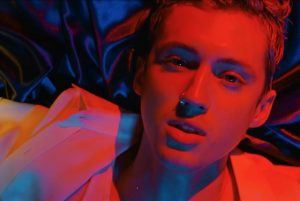
If anything, 2018 is the year of Troye Sivan (he isn’t new; he already achieved commercial and critical success with his debut album Blue Neighbourhood in 2015), but with his next era of music, Sivan seems to have shed his somber, teenage indie pop vibes in favor of some grown-up electronic, dance-pop bangers—as Billboard writes, “‘My My My!’ evidences an adult who’s already there, brimming with confidence from the first chopped-up synth moan.” And did I mention it’s all super gay and gives me so much life?
“Stop Me From Falling” – Kylie Minogue

Our one and only Australian pop queen ventured into country pop with her fourteenth studio album released this April (full review here) and “Stop Me From Falling” will be the song of your summer after just one listen.
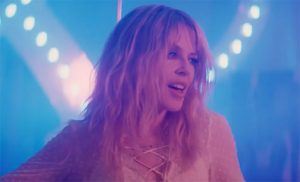
Our one and only Australian pop queen ventured into country pop with her fourteenth studio album released this April (full review here) and “Stop Me From Falling” will be the song of your summer after just one listen.
“Never Be the Same” – Camila Cabello

I truly was never the same after hearing Camila Cabello’s second single from her debut solo album (full review here)—the 21-year-old powerhouse proves her incredible vocal range by effortlessly shifting from a throaty growl to an impossibly high near-whisper (something that continues to be mocked but, honestly, check your baggage because this flight is full). I never liked Fifth Harmony, the girl group Cabello left in favor of a solo career in 2016, but after just the first six months of 2018, she has proven that she was always supposed to be just Camila.

I truly was never the same after hearing Camila Cabello’s second single from her debut solo album (full review here)—the 21-year-old powerhouse proves her incredible vocal range by effortlessly shifting from a throaty growl to an impossibly high near-whisper (something that continues to be mocked but, honestly, check your baggage because this flight is full). I never liked Fifth Harmony, the girl group Cabello left in favor of a solo career in 2016, but after just the first six months of 2018, she has proven that she was always supposed to be just Camila.
“No Tears Left To Cry” – Ariana Grande
I didn’t fall in love with this song upon first listen, but it grew on me almost immediately thereafter: Grande does not disappoint with the lead single from her upcoming fourth studio album, Sweetener.
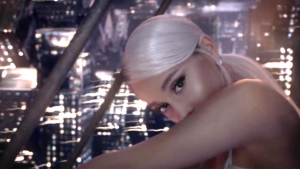
I didn’t fall in love with this song upon first listen, but it grew on me almost immediately thereafter: Grande does not disappoint with the lead single from her upcoming fourth studio album, Sweetener.
“Flames” – David Guetta & Sia

Manages to be deep yet also somehow light, uplifting and makes you want to dance, all at the same time? Sia sure knows how to bring that out in people.

Manages to be deep yet also somehow light, uplifting and makes you want to dance, all at the same time? Sia sure knows how to bring that out in people.
“Make Me Feel” – Janelle Monáe

I didn’t end up liking Janelle Monáe’s latest album, Dirty Computer (not really my cup of tea, but I admire the boundaries she’s pushing), but I may or may not have gotten so obsessed with this song when it first came out that I’ve now gotten so sick of it I don’t want to hear it anymore. Why am I like this?
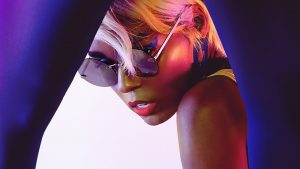
I didn’t end up liking Janelle Monáe’s latest album, Dirty Computer (not really my cup of tea, but I admire the boundaries she’s pushing), but I may or may not have gotten so obsessed with this song when it first came out that I’ve now gotten so sick of it I don’t want to hear it anymore. Why am I like this?
“Solo” – Clean Bandit feat. Demi Lovato

Catchiest of all the catchiest bops this year has seen.

Catchiest of all the catchiest bops this year has seen.
“Wait” – Maroon 5

I don’t know what it is with just about every Maroon 5 single that makes me want to stop and sing along to every note? It also helps that in an alternate universe I’m married to Adam Levine.

I don’t know what it is with just about every Maroon 5 single that makes me want to stop and sing along to every note? It also helps that in an alternate universe I’m married to Adam Levine.
“High Horse” – Kacey Musgraves

I don’t even know how she managed to do it but I think Kacey Musgraves released the catchiest song of all-time?
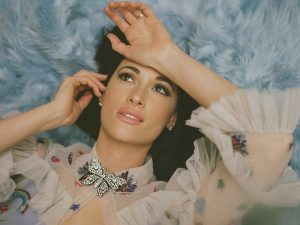
I don’t even know how she managed to do it but I think Kacey Musgraves released the catchiest song of all-time?
“Back To You” – Selena Gomez

Part of me wishes this was the lead single from Selena Gomez’s next album instead of a song for the 13 Reasons Why soundtrack but we will take what we can get.
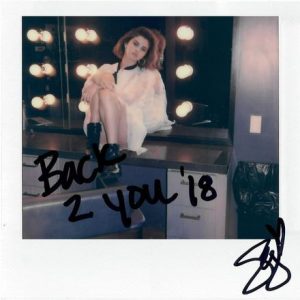
Part of me wishes this was the lead single from Selena Gomez’s next album instead of a song for the 13 Reasons Why soundtrack but we will take what we can get.
“Lost In Japan” – Shawn Mendes

The best song from Shawn Mendes’ new album (full review here) and also my favorite.

The best song from Shawn Mendes’ new album (full review here) and also my favorite.
“WOW” – Victoria Duffield

WOW is right—after a few years away, Canadian pop star Victoria Duffield returned with some killer new singles with her third studio album, Day 1, on the way. Duffield has grown since we last heard from her and has the proof to back it up.

WOW is right—after a few years away, Canadian pop star Victoria Duffield returned with some killer new singles with her third studio album, Day 1, on the way. Duffield has grown since we last heard from her and has the proof to back it up.
“Colour” – MNEK feat. Hailee Steinfeld

I swear, Hailee Steinfeld could collaborate on a new single with a rock and it would be an absolute bop.

I swear, Hailee Steinfeld could collaborate on a new single with a rock and it would be an absolute bop.
“Bloom” – Troye Sivan

Seriously—Troye Sivan has already released 3 of the 10 songs from his second studio album which comes out on August 31, also called Bloom (and may I just say that 10 songs IS NOT ENOUGH), and all of them are inexplicably amazing (and gay). Remember, this song is about flowers (just kidding; it’s totally about gay sex.)

Seriously—Troye Sivan has already released 3 of the 10 songs from his second studio album which comes out on August 31, also called Bloom (and may I just say that 10 songs IS NOT ENOUGH), and all of them are inexplicably amazing (and gay). Remember, this song is about flowers (just kidding; it’s totally about gay sex.)
“Get Me High” – Victoria Duffield

From the high notes to the killer EDM vibes, just all around perfection.
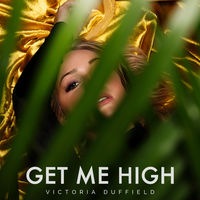
From the high notes to the killer EDM vibes, just all around perfection.
“Fall in Line” – Christina Aguilera feat. Demi Lovato

Two of the strongest vocalists of their respective generations teamed up for one song and honestly I’m surprised the universe didn’t implode.

Two of the strongest vocalists of their respective generations teamed up for one song and honestly I’m surprised the universe didn’t implode.
“IDGAF” – Dua Lipa

This may be the eighth single from Dua Lipa’s debut album that is already a year old, but she did not come to play around. Pop music is so much better with Dua Lipa in it.
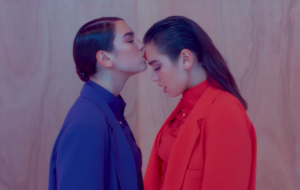
This may be the eighth single from Dua Lipa’s debut album that is already a year old, but she did not come to play around. Pop music is so much better with Dua Lipa in it.
“Tiny Dancer” – Florence + the Machine

This March, two tribute albums were released in honor of Elton John and his longtime songwriting partner Bernie Taupin: one called Revamp with pop/R&B artists covering his songs and another called Restoration with country artists covering his songs. “Tiny Dancer” is probably one of the hardest songs to cover well, let alone one of the hardest Elton John songs to cover well, but Florence + the Machine do such a good job that I almost like it more than the original…which is, well, impressive.
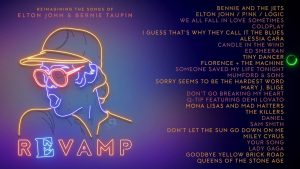
This March, two tribute albums were released in honor of Elton John and his longtime songwriting partner Bernie Taupin: one called Revamp with pop/R&B artists covering his songs and another called Restoration with country artists covering his songs. “Tiny Dancer” is probably one of the hardest songs to cover well, let alone one of the hardest Elton John songs to cover well, but Florence + the Machine do such a good job that I almost like it more than the original…which is, well, impressive.
Subscribe to:
Posts (Atom)





